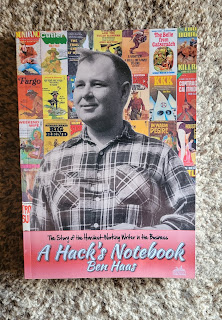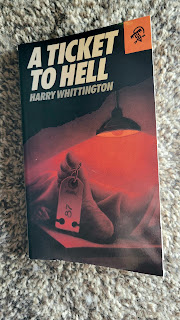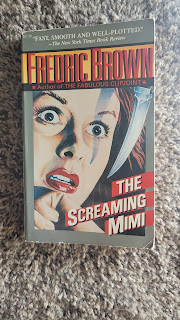Now, being a bookman, I got a fairly large list of "wants." And some of even the hardest to track down have shown up at least once or twice in my years of looking. Sometimes for high prices, sometimes for four bucks. I haven't always snapped them up at the high prices, I'm a cheap bastard after all but I knew I'd probably burn a hole in a credit card, if need be, to own "Cut." I assume the book didn't sell and was remaindered for a few copies that are floating around since Pinnacle was a pretty big wide-reaching publisher. Couple that with Glorious Trash's review and the authors own cache, whoever had them wasn't selling them.
Laurence James was very prolific, writing biker books, science fiction, westerns, post-apocalyptic fiction, War stuff and even horror. He's mostly known for his work on the Deathlands series and The Apache books. I have a bunch of his work, but this is the first time I've read anything by him, at least half-by him anyway. Knowing he wrote the more extreme parts of the narrative his days writing the "Piccadilly Westerns" is apparent, as it sort of reads like a 70s update of the wild ways of the Piccadilly Westerns. John Harvey is now a respectable writer having written the popular Charlie Resnick procedural novels. But he started in the paperbacks, writing, you guessed it, westerns, war books, and crime fiction. I reviewed an entry in his Scott Mitchell books, a British private eye who's a tough cookie. Together they came together and switched alternated chapters to write this book as Jerry Bronson. And it seems like they had a good time doing it because this one funky novel.
Finally, I got my hands on a copy (Thanks Stan!) via some good-natured trading among a fellow enthusiast. It had to travel from Canada to the U.S. and after sending some money to the wrong person for shipping I eventually found it in my mailbox on one cold and snowy night. Would it be as good as I wanted it to be after this long of a search? Seems impossible.
The opening is one of the sleaziest things I've ever read, a wild killing on a porn set. Off to a good start. Then we meet Regan, a .44 Magnum packin' asthmatic private eye in California. I'm with it so far. And soon I forgot my expectations and rolled along with the wild, slap-dash, kooky tale of Snuff films, Boris Karloff stand-ins, hippie-communes, gory action and sexy sex. It's a novel brimming with first-draft energy and two authors trying to one-up each other every chapter. A chase and murder in Disney world? Random sex with ugly old prostitutes? Beheadings? .44 magnum blasts? Kicks in the nuts? It's a got it all and more. It does all sort of hang together enough to make sense from A to Z, it's not the most polished (or fleshed out) but James and Harvey were pros at quicky paperbacks.
Reagan is a big 'ol nasty "Dirty Harry"-type, ex-cop turned private eye after he blows away the punk that sound the junk that made his wife O.D. he misses his wife, but mostly he just drinks, bangs ladies and shoots people. In a nice running-joke a lot of the chapters open with Reagan hungover after the previous night's escapades. He's nominally searching for a socialite's runaway sister and pretty much immediately finds her without a lot of effort other then stopping for gas and making conversation. But being a mystery that's not the whole story. It shifts from a more mystery format into a full-blown Men's Adventure thriller as it goes. Reagan's a bastard and a hardcase but that's the kind of guy you need when dealing in snuff films.
It has an exploitation film vibe, probably because filmmaking is an integral part of the plot. I can easily imagine it in a grindhouse of 42nd street or in a drive-in in the south. I doubt they could have gotten Karloff for the baddie though even though that's who I pictured throughout. The whole thing has its tongue squarely in in its cheek. So, was it worth the wait and the hunt? Yeah absolutely....for me anyway, I can certainly see most folks not caring for it. It's crazy violent, sexist and certainly in need of some coherent editing. It's probably the most sordid book I've ever read from Pinnacle, who probably bought it because they were putting out work by both James and Harvey in the Apache series at the same time but it's clear they didn't devote much more time to it other than slapping the most awesome photo covers on it ever.
One chapter of my book hunting is closed now. It's nice and it's sad. Now, I'll probably fall into a copy of "Cut" in my local used bookstore tomorrow. That's the way it goes sometimes. Luckily as far as hunting goes, I still have plenty to search for. Some of which I'm not even sure if they were published. That's part of the fun of this era of paperback publishing. It's wild and unpredictable just like the novels they put out.













